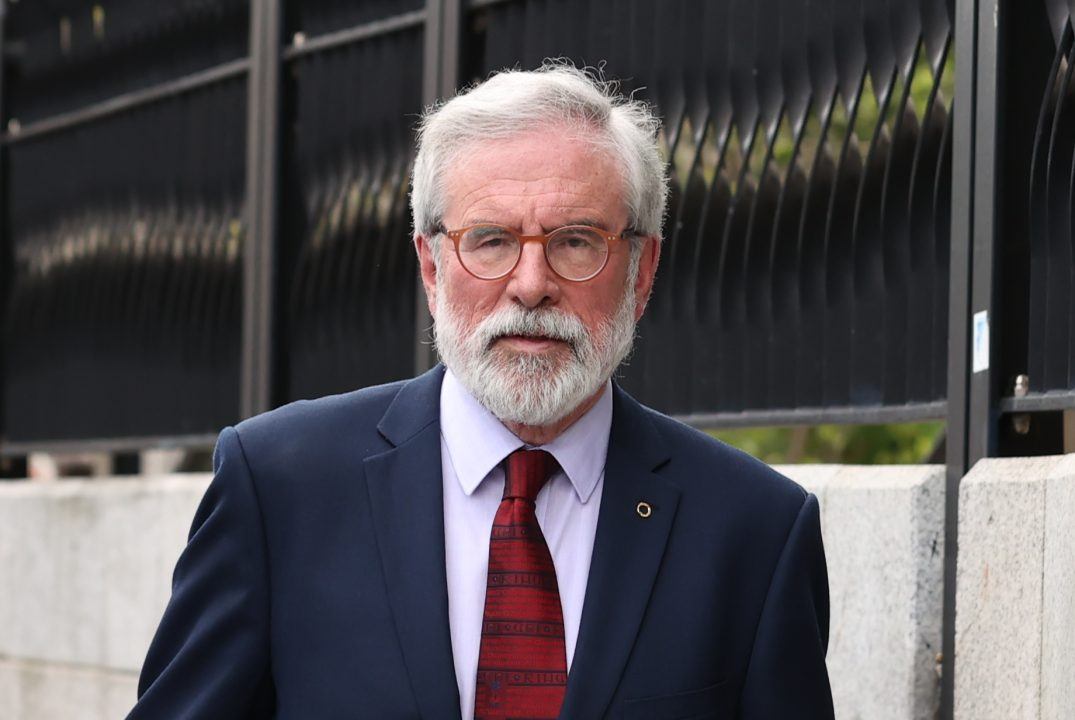Gerry Adams has told a libel hearing that he does not remember how many people were killed in IRA atrocities such as Bloody Friday or the Claudy bombings.
There were sharp exchanges between Mr Adams and a barrister for the BBC at Dublin High Court as he was quizzed about a number of terrorist killings.
The former MP and Sinn Fein leader is continuing to give evidence in his defamation case against the broadcaster at the High Court in Dublin.
He claims a BBC Spotlight programme, and an accompanying online story, defamed him by alleging he sanctioned the killing of the former Sinn Fein official Denis Donaldson.
Mr Donaldson, who had worked for Sinn Fein, was shot dead in Donegal in 2006, months after admitting his role as a police and MI5 agent for 20 years.
Mr Adams denies any involvement.
In 2009, the Real IRA admitted killing Mr Donaldson.
The Spotlight programme was broadcast in September 2016.
Mr Adams entered the witness box for a fourth day where he faced questioning from counsel for the BBC, Paul Gallagher SC.
The barrister began his cross-examination by asking how many people were killed during the Troubles.
Mr Adams said there had been around 3,500 deaths with “countless others injured and traumatised”.
He said he could speak from personal experience, stating that his brother-in-law had been shot by the British Army.
He said there was still a live threat against him from dissident republicans.
Mr Adams said: “I have met with numerous victims and survivors, including victims of the IRA.”
Asked by Mr Gallagher what proportion of Troubles deaths and injuries were the responsibility of the IRA, he said: “A lot, what has this got to do with the Spotlight programme?”
The barrister said that the book Lost Lives stated that 48.5% of Troubles deaths were the responsibility of the IRA, amounting to 1,758 deaths.
Mr Adams told the court he had no reason to dispute that figure.
He said: “That was the main reason for my work to build the peace process, to bring it to an end.”
Mr Gallagher then referred to a number of IRA atrocities in the 1970s, including Bloody Friday in 1972.
Nine people died and 130 were injured when a number of IRA bombs exploded across Belfast on July 21 1972.
Mr Adams said it was “terribly wrong, quite a few people were killed, it was a disaster”.
Mr Gallagher asked him how many people were killed.
Mr Adams said he did not remember.
Mr Gallagher said it was one of the most “infamous” incidents of the Troubles, stating the details of it must be known to Mr Adams as a republican.
Mr Adams responded: “The IRA apologised, and 30 years later apologised again.”
The barrister asked him again how many people were killed.
Mr Adams said: “I have already answered that.”
Mr Gallagher asked him to give an estimate of the number of deaths, but Mr Adams said he was “trivialising the details”.
The barrister then asked him how many people were killed in the 1972 Claudy bombings.
Mr Adams said he did not know.
He added: “I remember it was another disaster, a wrong action.”
The barrister then asked him about meetings he had attended with other senior republicans in 1972 with UK Government representatives in an effort to negotiate an agreement following an IRA truce.
Mr Gallagher asked him about the attendance of republican Daithi O Conaill at the talks, whom he described as a leader of the IRA.
Mr Adams said: “I was there and he was there in our capacity as leaders of Sinn Fein.”
Mr Gallagher asked: “Why can you not answer that he was a member of the IRA?”
Mr Adams said the group was there to broker a ceasefire which Mr O Conaill would then bring back to the leadership of the IRA.
Mr Gallagher said: “Were Sinn Fein empowered to negotiate on behalf of the IRA?”
Mr Adams said: “No, our briefing was not to negotiate on behalf of the IRA, the briefing was to negotiate a package which Daithi would bring back to the IRA.”
After the barrister continued to ask about the 1972 meeting, Mr Adams said: “I thought we were going to talk about Denis Donaldson, not a meeting which happened 50 years ago.”
The barrister went on to ask him if he remembered a number of further IRA incidents.
Mr Adams said incidents in which civilians were killed were some of the “biggest regrets” of his life.
Referring to the La Mon bombing in 1978, Mr Adams said: “It doesn’t matter who it was, it was wrong.”
As the barrister continued to ask questions about IRA killings, Mr Adams said: “What has this got to do with Denis Donaldson?”
Mr Gallagher said: “I will ask the questions.”
Mr Adams said the barrister was “persisting in asking me to remember events, to remember atrocities”.
When the barrister began to ask about IRA killings in the Republic of Ireland and the view of the Irish government towards the IRA, Mr Adams said the Irish government “had for a long time played no positive role in bringing peace to the island of Ireland”.
He said: “Successive Irish governments abandoned people of the north.”
Mr Adams said he was “surprised” the barrister was not interested in asking him about the Dublin and Monaghan bombings, carried out by loyalists in 1974.
Mr Adams, 76, stepped down as Sinn Fein president in 2018 after 34 years at the helm.
He served as an MP for West Belfast and represented Co Louth in the Irish parliament for nine years until the 2020 general election, when he retired from politics.
The case, which is expected to last four weeks, will resume on Tuesday.
Follow STV News on WhatsApp
Scan the QR code on your mobile device for all the latest news from around the country


 PA Media
PA Media

























